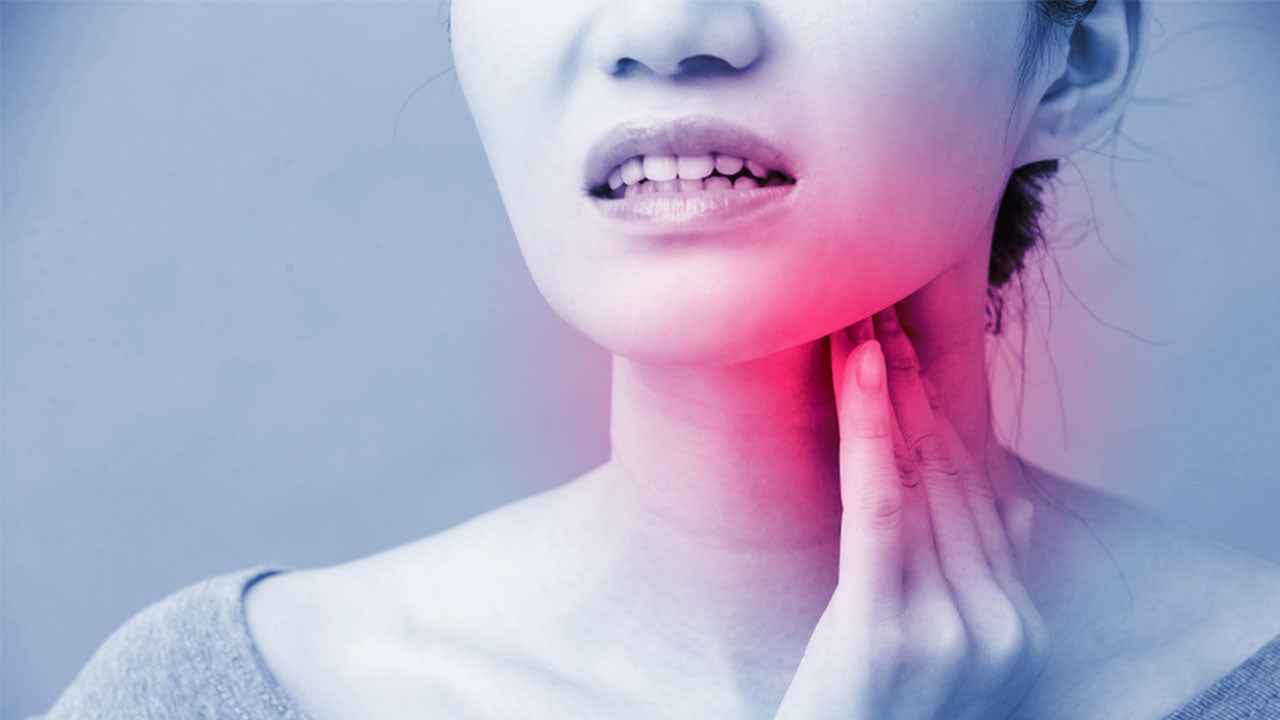Understanding the Thyroid and Tips for Improving Thyroid Health
 By: by Amino Science
By: by Amino Science

The thyroid is a small, butterfly-shaped gland that sits just below the voice box. The thyroid’s responsibility is to extract iodine from the foods we eat and convert it to thyroid hormones. It does this by combining iodine and the amino acid tyrosine to make the two primary thyroid hormones thyroxine (T4) and triiodothyronine (T3).
Thyroid hormones are commonly believed to influence weight—and that is true, but thyroid hormones are required throughout the body, in virtually every cell, to regulate metabolism. When the thyroid gland stops operating correctly, the symptoms are life-altering.
There are three primary thyroid diseases.
Hypothyroidism
Hypothyroidism is the term used when the thyroid gland doesn’t produce enough T(4) and/or T(3) for proper metabolism functioning.
Hyperthyroidism
Hyperthyroidism is the term used when the thyroid gland produces too many thyroid hormones.
Thyroid Cancer
Thyroid cancer typically doesn’t cause symptoms or overt signs early in the disease. As it grows, it can cause changes in your voice, difficulty swallowing, swollen lymph nodes, and a lump in your neck.
A special note about thyroid nodules: Thyroid nodules are abnormal growths of thyroid cells that lump together in the thyroid gland. According to the American Thyroid Association, the vast majority of nodules are noncancerous, but a small proportion contain thyroid cancer cells. If you are concerned about changes in your neck or throat, make an appointment with your physician to be evaluated.
6 Ways to Boost Thyroid Gland Health
The health of the thyroid gland is imperative for overall wellness. If your body produces too much thyroid hormone, you are at risk for brittle bones, heart problems, eye problems, and thyrotoxic crisis.
If your thyroid doesn’t provide enough thyroid hormone, it can cause underactive thyroid symptoms including goiters, heart problems, depression, anxiety, peripheral neuropathy, infertility, and birth defects. If thyroid disease runs in your family, take special care of your thyroid now!
1. Amino Acid Supplements
L-carnitine alleviates fatigue in individuals with hypothyroidism, especially those who have had a thyroidectomy following thyroid cancer, according to a randomized, double-blind, placebo-controlled trial published in the Endocrine Journal.
The amino acid L-tyrosine works with iodine to make thyroid hormone according to Milton S. Hershey Medical Center at Penn State Hershey. However, if you are taking thyroid hormone medication or have high blood pressure, do not take an L-tyrosine supplement without speaking to your doctor.
It’s also important to take a supplement with an ideal proportion of all the essential amino acids so as not to disrupt the concentration of amino acids in the bloodstream. Doing so can impair protein synthesis and alter brain chemistry, thereby affecting moods.
2. Manage Stress
Chronic or unmanaged stress takes a toll on your spirit, your adrenal glands, and your thyroid function. Learn to manage stress by employing deep breathing techniques, practicing yoga, meditating, and journaling.
3. Exercise Regularly
An underactive thyroid and an overactive thyroid can zap your energy, increase stress, and cause insomnia. It is essential to exercise regularly—even if it is just taking a 30-minute walk or enjoying a dance class. Do your best to build up to a minimum of 30 minutes a day of moderate exercise to boost mood and improve your overall health.
4. Get Some Sunshine!
Vitamin D deficiency is considered a global health problem. Vitamin D is essential for proper absorption of calcium, regulating mood, and protecting against heart disease. Vitamin D deficiency is linked to certain types of cancers, such as colon cancer, breast cancer, and prostate cancer.
And according to a report published in the International Journal of Health Sciences, individuals with thyroid disease have significantly lower levels of vitamin D than do individuals with normal thyroid function. Eat more vitamin D rich foods, take a vitamin D3 supplement daily, and aim for getting at least 20 minutes of sunshine a day.
5. Fight Inflammation
Avoid foods that you are allergic to and those that you are sensitive to. When we eat foods that cause a reaction in our bodies, we are increasing inflammation in the body. The Cleveland Clinic recommends consuming fresh colorful fruits and vegetables, whole grains, and omega-3 fats while limiting red meat, refined starches, and unhealthy fats to limit inflammation in the body.
6. Fill Your Plate With Antioxidant-rich Foods
Antioxidants such as vitamin C, vitamin E, beta-carotene, selenium, manganese, and omega-3 fatty acids are essential for people with hypothyroidism. In a study published in the International Journal of Molecular Sciences, researchers have identified an imbalance between free radicals and defending antioxidant bodies in people with thyroid disease.
4 Foods to Avoid If You Have Hypothyroidism
Hypothyroidism occurs when your thyroid gland is underactive and doesn’t make enough essential thyroid hormone to keep your metabolism revving properly. If you have hypothyroidism symptoms, try removing the following food groups from your diet to see if symptoms improve.
1. Cruciferous Vegetables
Cruciferous vegetables can cause goiters to develop in some people. They have a chemical compound that may prevent your thyroid gland from getting enough iodine.
2. Soy
Soy and soy products may prevent the thyroid gland from producing hormones, and soy interferes with thyroid medications.
3. Organ Meats
The fatty acid, lipoic acid, found in organ meats interferes with thyroid medicine absorption, and too much may cause the thyroid gland not to produce ample hormones.
4. Gluten
If you have been diagnosed with Celiac disease, eating gluten may increase your risk for autoimmune thyroid diseases such as Hashimoto’s disease and Graves’ disease.
5 Foods That May Help Hypothyroidism
Hypothyroidism may be a sign of a nutritional deficiency. The following food groups are associated with supporting individuals with an underactive thyroid.
1. Iodine-Rich Foods
Iodine deficiencies are more prevalent than many people realize. And certain groups, including pregnant women, vegetarians and vegans, and individuals who don’t use iodized salt, are at a heightened risk for an iodine deficiency.
The best food sources of iodine are fish, shellfish, seaweed, and algae. These foods may help support healthy thyroid function in those with an underactive thyroid gland.

2. Leafy Greens
Many people with hypothyroidism have a magnesium deficiency. Eating a couple of servings of magnesium every day may help relieve muscle cramps and fatigue associated with an underactive thyroid.
3. Selenium-Rich Foods and Iron-Rich Foods
Anemia is a common deficiency in individuals with thyroid disease. Cashews, almonds, pumpkin seeds, and Brazil nuts are loaded with iron and may help to improve thyroid function.
Brazil nuts specifically should be high on the list for those with hypothyroidism, as they also contain a healthy dose of selenium. According to a review in the journal Clinical Endocrinology, selenium may stave off long-term damage to the thyroid gland in individuals with thyroid disease.
4. Dairy
If you have an iodine deficiency, a couple of servings of yogurt or milk a day may help improve your thyroid function. One cup of plain yogurt can provide up to half of the recommended daily amount of iodine in your diet. Be sure to read labels carefully, as the amount of iodine varies greatly depending on the brand of yogurt or milk you select.
5. Zinc-Rich Foods
A zinc deficiency is directly associated with hypothyroidism according to a report published in the International Journal of Trichology. Add more zinc-rich foods to your diet, like beef, poultry, and cocoa powder, especially if you have hypothyroidism and are experiencing hair loss.
4 Foods to Avoid If You Have Hyperthyroidism
Hyperthyroidism occurs when the thyroid gland makes too much thyroid hormone. Hyperthyroidism and hypothyroidism are polar opposites—so some of the foods that appear on the “avoid” list on hypothyroidism will appear on the “enjoy” list for hyperthyroidism. Talk to your physician about any specific questions you may have.
1. Iodine-Rich Foods
The American Thyroid Association recommends a low iodine diet for individuals with an overactive thyroid. Iodine in your diet may adversely affect radioactive iodine therapy and may exacerbate production of the thyroid hormone.

2. Nitrate-Rich Foods
Nitrates can cause too much iodine to be absorbed by the body, which can lead to hyperthyroidism and an enlarged thyroid. Nitrates are commonly found in deli meats and certain processed foods, but they also occur naturally in foods like beets, spinach, leeks, fennel, and others.
3. Soy
Soy acts as a hormone in the body and may interfere with conventional thyroid disease medications.
4. Gluten
If you have Celiac disease, avoiding gluten may help prevent inflammation of the thyroid gland and gastrointestinal tract.
6 Foods That May Help Hyperthyroidism
The following foods may improve hyperthyroidism symptoms and improve the overall health of the thyroid gland.
1. Cruciferous Vegetables
Cruciferous vegetables are recognized for their ability to impede thyroid function. This is why they are on the “avoid” list for those with an underactive thyroid gland and on the “enjoy” list for those with an overactive thyroid gland.
2. Iron-Rich Foods
Iron is an essential mineral that supports the transportation of oxygen throughout the bloodstream. Anemia or low levels of iron are linked to hyperthyroidism and autoimmune thyroiditis according to a report published in the Journal of the Formosan Medical Association. Avoid iron-rich foods within two hours of taking any thyroid medications to prevent poor absorption of the medication.
3. Selenium-Rich Foods
As cited above, research shows that selenium may protect against long-term damage to the thyroid gland for individuals with thyroid disease—either hypothyroidism or hyperthyroidism.
4. Calcium-Rich Foods and Vitamin D
Two of the side effects of hyperthyroidism are brittle bones and depleted bone mass. If you have an overactive thyroid gland, it is imperative you add a variety of calcium-rich foods to your diet.

5. Low-Iodine Foods
Iodine can spur thyroid hormone production and interfere with hyperthyroid medications. Focus on low-iodine foods like egg whites, nut butter, potatoes, honey, fresh fruit, and maple syrup, and use sea salt or Himalayan salt instead of iodized salt.
6. Zinc-Rich Foods
A deficiency in the mineral zinc is associated with poor thyroid function. Zinc is essential for keeping the immune system functioning properly, and it helps the body use food for energy.


Up to 25% off Amino
Shop NowTAGS: conditions natural cures
Join the Community
Comments (0)
Most Craveable Recipes




 833-264-6620
833-264-6620



















